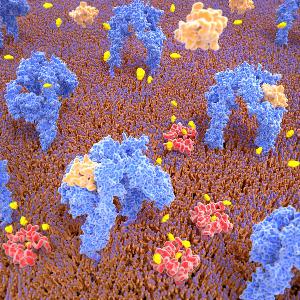
MSPT allows the analysis of molecular mass, movement and interaction of proteins on biological membranes. | © ©Juan Gärtner - stock.adobe.com
Cellular processes on membranes are often fast and short-lived. Molecules assemble briefly, separate again, interact with different partners and move along or through the membrane. It is therefore important to not only study static snapshots of these processes, but also to understand their dynamics. But how can this be achieved methodically? Petra Schwille from the MPIB and Nikolas Hundt from the LMU together with their team have developed the method Mass-Sensitive Particle Tracking - MSPT, which allows to analyze proteins during dynamic processes on membranes.
The starting point for the biophysicists were recent advancements in mass photometry, which could already be used to determine the molecular mass of unlabeled molecules in solution. What is new about MSPT is that the dynamics of membrane-associated proteins can now be tracked in their biologically plausible environment. In this process, individual proteins are identified by their molecular mass without the need for labeling. Frederik Steiert, one of the first authors of the publication, says: "We can now track directly on biological membranes what mass individual proteins have, how they move and how they interact. This allows us to study the dynamics of biological systems in greater detail." Analyzing dynamic processes is particularly important in biology as many processes at the membrane are transient.






